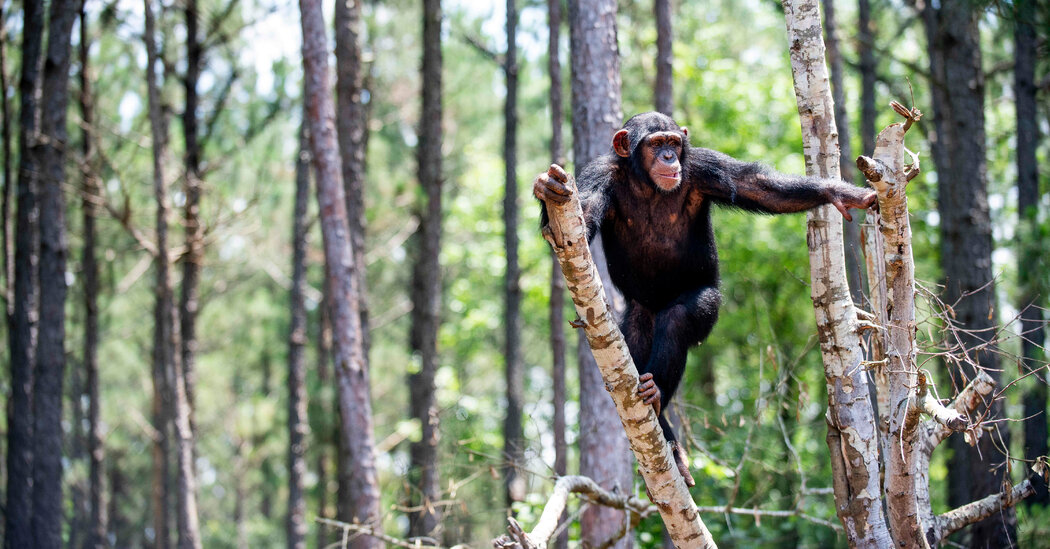It has been more than two decades since chimpanzee research came to a halt at the Alamogordo Primate Facility in New Mexico. And yet, some two dozen chimps still live there, despite a federal law that requires such retired research chimps to be moved to sanctuary.
In 2022, a judge ruled that the National Institutes of Health, which owns the chimps, was violating the law by refusing to move the animals to a wooded sanctuary in Louisiana. Earlier this year, the agency dropped its appeal of the ruling.
But the N.I.H. says it has no immediate plans to move the animals, citing concerns about the animals’ health — and a legal footnote that may exempt the agency from moving chimps that are “moribund,” a term that typically means near death.
As of last October, 28 chimps remained at Alamogordo, all of whom were moribund, the N.I.H. said in an email. It defined moribund as suffering from “life-threatening, systemic disease that poses a constant threat and could result in abrupt death.”
Some of the animals had previously been diagnosed with advanced cardiovascular disease, which is common in older chimps.
The N.I.H.’s refusal to transfer the chimps has drawn criticism from lawmakers, veterinarians and animal rights advocates.
The Humane Society of the United States, which sued the N.I.H. over its unwillingness to move the chimps, noted that the agency had been describing the chimps as “moribund” for years, making it unlikely that the animals were truly on the brink of death.
“They really need to stop making excuses,” said Kathleen Conlee, vice president of animal research issues at the Humane Society. “A lot of chimpanzees have moved to sanctuary with health conditions and thrived in their new environment.”
Independent veterinary experts, who had not examined the Alamogordo chimps personally, also wondered how animals could be moribund for years.
“‘Moribund’ in human or veterinary medicine is generally understood to mean death is imminent,” said Dr. Felicia Nutter, a wildlife veterinarian at Tufts University. “So any determination that chimps have been moribund for three years — there’s something not right with that.”
Transportation does pose risks, said Dr. Kathryn Gamble, the director of veterinary medicine at Lincoln Park Zoo in Chicago. But even significant cardiac disease does not make such moves impossible, she said.
“We have humans that have anything from mild to severe cardiac disease — many of them still travel,” Dr. Gamble said. And the risks of transport should be weighed against the potential benefits that might come from the change in environment, she said.
The Chimpanzee Health Improvement Maintenance Protection, or CHIMP, Act, which Congress passed in 2000, established a national chimpanzee sanctuary system and stipulated that federally owned chimps that were not needed for research be sent to sanctuary. Chimp Haven, a 200-acre sanctuary in Louisiana, serves as the designated retirement home.
In 2015, the N.I.H. announced that it would no longer support biomedical research on chimpanzees, and many Alamogordo chimps have since moved to Chimp Haven. But in 2019, the N.I.H. said that a veterinary panel had concluded that the 44 chimps remaining at Alamogordo were too sick to leave.
“The physiological and psychological stressors associated with transportation, quarantine, change in social structure and change in human care provider could trigger a fatal cardiac event,” the panel wrote in one case summary. The panel also expressed concern that chimps with disabilities, including cataracts and a leg amputation, might not integrate safely into new social groups and settings.
The Humane Society and other animal rights groups sued over the decision, accusing the N.I.H. of violating the CHIMP Act. In December 2022, a federal judge ruled in their favor, but added, in a footnote, “The parties appear to agree that N.I.H. is not obligated to transfer a ‘moribund’ chimpanzee to sanctuary.”
The Santa Fe New Mexican reported last month that the N.I.H. had no immediate plans to transfer the chimps.
“N.I.H. plans to conduct an annual evaluation of the chimpanzees at Alamogordo to determine if they are moribund, or if they are no longer moribund and can be safely transported to Chimp Haven,” the agency said in an email.
A plan for annual evaluations suggested that the chimps were not on the brink of death, said Rana Smith, the president of Chimp Haven.
Ms. Smith also objected to the agency’s interpretation of the law, noting that the CHIMP Act does not use the word “moribund” or make exceptions for chronically ill chimps. “We have found that chimpanzees are an incredibly resilient species and thrive in the sanctuary environment,” she said.
Several U.S. lawmakers have been urging the N.I.H. to transfer the remaining Alamogordo chimps for years. “I have been advocating for a humane and permanent solution for these chimpanzees, so they can live out the rest of their lives in a non-laboratory sanctuary environment,” Senator Martin Heinrich, Democrat of New Mexico, said in an emailed statement.
The agency’s refusal to move those chimps “stands in direct violation of federal law,” he added. “I am urging them to reconsider.”
